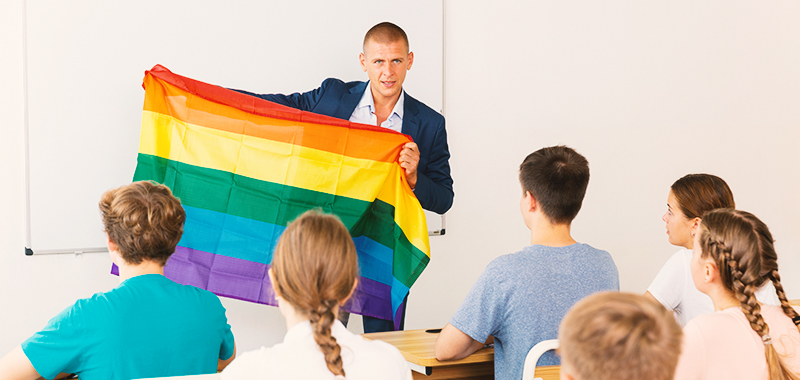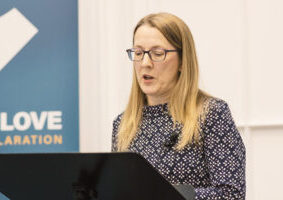‘Pride’ – What’s the harm?

Each June, a month of celebration of lesbian, gay, bisexual and transgender ‘Pride’ takes place across the UK. The concept began with the Stonewall riots in 1969 and continued with Pride marches, which spread across the USA. Initially they were protests calling for ‘gay rights’. But today we see parades and events in towns and cities, celebrating a whole host of sexual identities and practices (LGBTQIA+).
Over the past decade, UK schools have increasingly been encouraged to hold their own Pride events to encourage pupils to celebrate the ever growing range of sexual and gender identities they are told they can choose from. Widely-used school resources by providers such as Twinkl and TES, as well as specific RSE providers (such as Educate and Celebrate, The Proud Trust, Just Like Us and Stonewall), suggest activities and materials that can be used to celebrate within both Primary and Secondary Schools. Children are encouraged to attend local Pride parades and these events often provide specific activities for children. Children’s “educational” programmes and websites often promote the celebration of Pride.
But aren’t there potential harms for children?
Sexualisation of children
Jo Bartosh comments in an article in The Critic:
“Unbridled (or indeed bridled) displays of male sexuality have long been a feature of Pride. But as the parade becomes increasingly family-focused, more people are questioning what place fetishes have at parades, particularly in light of historic concerns.”
In recent years there have many documented concerns about public displays of sexual fetishes and sexualised behaviour in Pride events. Adults can be dressed in bondage outfits or barely dressed at all. Some people are dressed as “pups” with collars and leashes, as well as others brandishing whips and batons. This all takes place in an event which has much that appeals to children. Jo Bartosh again:
“Rainbow flags, drag queens, parades and glitter of course have an appeal to children unaware of the sexual and political connotations. To protect children we must be alive to the grown-up reality that there may well be an unsavoury agenda hiding in the shadow of the rainbow.”
The effect of exposing children to these fetishes and sexualised behaviour normalises sexual practices which may be harmful even for adults. It tears down barriers, making children potentially vulnerable to abuse. (If these things are demonstrated openly, then children will think they are safe and normal). Children are encouraged to experiment and are not warned about the dangers of this.
Skewed view of normality
Schools are being actively encouraged to celebrate Pride and to champion sexual minorities and extreme sexual practices. But there is very little teaching, let alone celebration, of marriage (one man and one woman) despite this being the likely future experience of the vast majority of children. The possibility of saving sex for marriage is almost never mentioned. Instead children hear it implied that denying your desires may cause harm.
The huge focus on actively encouraging children to not only accept a vast spectrum of sexual identities and behaviours, but to celebrate them, gives the impression they are far more common than they really are. Too often they are portrayed as much more exciting than ‘boring old heterosexual relationships’. For example, well-known ‘expert’ Justin Hancock’s sex education website BISH, aimed at teenagers, includes articles such as the horribly titled “Why penis in vagina sex can be meh” (*link content warning*).
Organisations such as Educate and Celebrate support schools with Pride workshops and Pride Youth Networks. Its founder and CEO Elly Barnes has been highly vocal about her wish to “smash heteronormativity”. That is to say, she wants people to stop thinking man-woman marriage, and therefore traditional family structure, is in any sense the norm.
So children are being taught that God’s design for marriage and sexual intimacy is at best boring; certainly not worth celebrating; and at worst that it is actually harmful and should be thrown out altogether.
Protecting our children
The Greater Love Declaration background document states:
Sexual difference and sexual attraction are made by God for the purpose of marriage and all the good that flows from it. Sexual union between husband and wife is designed by God as a delightful and joyful part of the union of their hearts and lives. However, sin has distorted and damaged sexual desires in all people, as it has all of human nature.
Sexual behaviour has particularly widespread effects far beyond those immediately engaged in it, on family, friends and beyond. Therefore, where sexual inclinations are wrongly indulged, this results in damage and harm to ourselves, to others and ultimately to all of society. Where they are resisted for the sake of others, the result is good for ourselves, for others and for all of society.
Ensuring that all people are treated with respect and not discriminated against or treated with prejudice is one thing. But the normalisation and celebration of relationships and sexual practices that go against God’s good design are particularly harmful to children, who need our protection most. As Christians we must be willing to continue to protect our children and to teach them that God’s ways are good, even when that means taking a stand against what is happening in schools and society.

Dr Julie Maxwell
A co-author of the Greater Love Declaration, Dr Julie Maxwell is a Paediatrician who has recently taken up the role of Deputy Director of Lovewise a charity which seeks to help parents, youth groups and schools by providing presentations on the subjects of marriage, sex and relationships from a Christian perspective. There are a variety of high quality resources available at https://lovewise.org.uk/ that can support you in teaching children and young people a Biblical perspective on relationships and sex.
A new book from Lovewise has been written for teenagers by Dr Chris Richards and Dr Liz Jones giving a Biblical perspective on some of these difficult areas.
Find it here: https://lovewise.org.uk/challenges-to-living-gods-way.html
